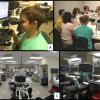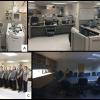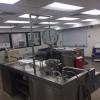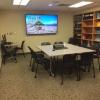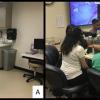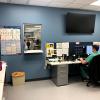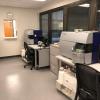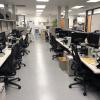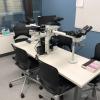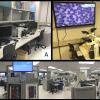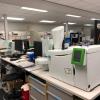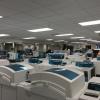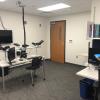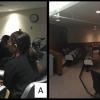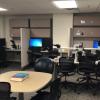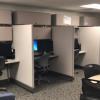The pathology department occupies approximately 100,000 sq. ft. of space in the Medical Laboratory Building, Medical Research Center and University of Iowa Hospitals & Clinics, and approximately 30,000 sq. ft. of space in the adjacent Veteran's Administration Hospital.
The department currently occupies approximately 26,000 sq. ft. of research-dedicated space in the Medical Laboratory Building and Medical Research Center. This space consists of modern laboratories and core facilities that support cutting edge cellular, molecular and genetic research investigating a range of diseases. Faculty in Pathology currently have research programs in immunology, inflammation and vascular biology, microbiology, neuroscience, signaling and cell death, stem cells, tumor biology and cancer, and virology. In addition to faculty-directed laboratories, the Department provides core laboratories to support the efforts of its investigators.
Surgical Pathology
The surgical pathology preview area consists of individual computer workstations with microscopes. The department continually updates the surgical pathology library; additionally, residents can access hundreds of pathology texts through the Hardin Library with their iPad or other device (provided by the department). Case sign out happens at one of the multi-headed scopes in the department or in individual faculty offices (residents always sign out one-on-one or two-on-one with faculty, never a fellow).
The gross room is located next to the operating rooms. There are numerous grossing benches, each with computer touch screens and cassette printing access. Residents work alongside 5 pathology assistants (PAs) and a surgical pathology fellow to gross specimens and perform frozen sections.
Transfusion Medicine
Residents work in the oldest continuously running blood bank in the United States, the DeGowin Blood Center, consisting of a blood donor collection center, blood bank, and an active apheresis clinic. Residents have their own office space and present at morning rounds.
Autopsy
Both hospital and medical examiner cases are performed in state-of-the-art autopsy suites. Residents on service share an office on the rotation and discuss cases each morning in the autopsy conference room/library. Investigative staff and law enforcement officials may attend these morning meetings.
Cytopathology
Residents on cytology are involved in on-site adequacy assessments, perform superficial FNA procedures, and preview cases. FNA procedures are performed on the inpatient floors or in the pathology–run FNA clinic. Case sign out occurs throughout the day at the cytology multi headed scope, which is also the site of the weekly resident-led interesting case conference.
Flow Cytometry
Residents have access to two 10-color flow cytometers (BD FACSCanto) in the laboratory. Residents’ Office/analyzing station is connected to the lab by a window. Residents have access to unique method for flow analysis: cluster analysis vs. traditional gating. Residents can analyze up to 12 parameters at a time. This office also contains a multiheaded scope and 3 workstations.
Hematopathology
The hematopathology resident workspace is adjacent to the lab and has individual workstations and scope areas.
Hematopathology sign out microscope area includes a large flat-panel display for sign-out or didactics/unknowns sessions.
Residents frequently review cases of interest with the clinical team here.
Microbiology
The microbiology resident office is located within the microbiology lab. Residents gain exposure to the newest diagnostic techniques (molecular and MALDI-TOF) as well as traditional testing. Residents also review smears for organisms throughout the rotation.
Molecular
The molecular office and sign out area is located adjacent to the molecular lab. Residents and fellows evaluate a variety of oncology and genetics cases requiring molecular testing and interpret results from a range of PCR and NGS-based tests.
Chemistry
The chemistry resident oversees the Core Laboratory which incorporates management skills, clinical correlation, and informatics troubleshooting. Residents are exposed to a wide variety of laboratory tests, involving both automated methods and specialized instrumentation, such as gas chromatography. Residents have their own office next to the Core Lab and sign out daily protein electrophoresis as well.
Lecture Halls
Numerous conference rooms and libraries can be found within the department. Daily teaching conferences occur most often in 5249 RCP and in the HP Smith auditorium.
Resident Room
The resident room is located in the hospital near all clinical workspaces. It is a quiet place to study, work on research, or finish up paperwork. There is a fridge and sink, plenty of workstations with microscopes, a multiheaded microscope with a camera, and each resident has their own space for storage.
